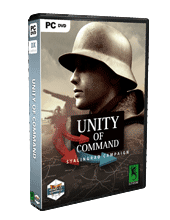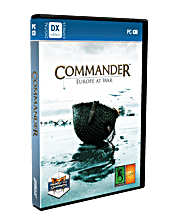I purchased Unity of Command in hopes of finding a game with more historical depth than PanzerCorps, but a bit less daunting than War in the East. I was initially put off by the unit icons, but having read a positive review on the Wargamer, I decided to give this one a try.
The interface is simple and intuitive, and the guided tutorial taught me all I need to know to get started. Bordered hexes indicate how far a unit may move and still attack, and a simple scroll of the mouse wheel shows hexes that may be reached using extended movement. Most unit details are apparent from the on board icon; others are available in a sidebar display.
Simple keystrokes offer views of terrain, weather, objectives, or supply lines. Theater resources - airstrikes, improvements to your supply network, air supply, bridge construction/demolition, and partisans for the Soviets - are indicated by icons along the side of the screen. The review I read saw little purpose to the bridging options, but use them wisely. They may open opportunities for attack or defense, and can alleviate (or create) supply problems.
The supply view is critical. Outrun your supplies or leave your supply lines open to the AI, and you will find your offensive running out of steam quickly. The supply mechanics demonstrate the simultaneous depth and simplicity of the game. The manual explains how supply points impact unit readiness, and how attenuated supply lines, weather, and terrain affect those lines. The supply view shows supply sources and assigns each hex a number, so you can easily see how your front line units will fair next turn when their readiness is calculated.
Movement and combat are with a simple point and click. Hovering over an enemy unit provides casualty estimates and retreat probabilities. Units possess a number of steps rating their combat effectiveness, and you may also assign specialist steps - engineers, towed AT, recon, or heavy tanks - that augment a unit's capabilities. You can easily see a unit's status by the color of the circles on it's icon, representing its steps.
While the interface is simple, determining where your best chance of a breakthrough may be and whether to sacrifice weaker units to attrite the readiness of an enemy unit make for a challenging game. Order your attacks incorrectly, and you will watch your chance to capture that objective slip by until next turn (I know this from personal experience).
Many of the scenarios are quick-playing, but still challenging. Operation Uranus, for instance, is only 5 turns, but trying to get your attacks just right to capture your objectives on time (this is critical), sealing off as many German units as possible in Stalingrad, provides quite a bit of replay value. And dont give the AI an opening to take back an objective. Youve been warned.
Speaking of the AI, I have played at least a dozen scenarios now, and finished two campaigns, and I find it offers a good game. It does have limitations. For instance, its a little too eager to seize supply sources. This is a good tactic generally, but you can almost bait it into exposing its own units to a quick encirclement. Then again, dont expect the historical reaction to the threat of encirclement in Stalingrad. And while it does display some aggression, the human and AI players for the various scenarios are fixed.
I was a little disappointed in the campaign game, which is simply a series of linked scenarios, rather than a monster scenario for the whole campaign. The scenario tree does vary with your results, however, so this adds some variety. The campaign engine also tracks prestige, which can be used for reinforcements or specialist steps in later scenarios. Some scenarios offer access to OKW/Stavka resources. Deploying these units or specialist steps has a corresponding cost in prestige and impacts your level of victory, so choose them wisely.
Overall, I am very pleased with this game, and look forward to more titles using this engine. If you have been looking for an accessible game that contains both historical and strategic depth, I highly recommend it. And now, back to the front. Im about to capture Rostov and seal off the remaining German divisions in the Caucasus



 Cart (0)
Cart (0)

